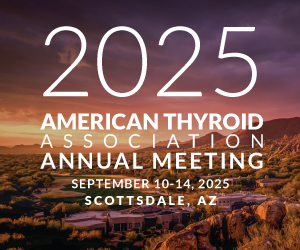RADIATION RISKS TO HEALTH: A Joint Statement from the American Association of Clinical Endocrinologists, the American Thyroid Association, The Endocrine Society and the Society of Nuclear Medicine
March 18, 2011
The recent nuclear reactor accident in Japan due to the earthquake and tsunami has raised fears of radiation exposure to populations in North America from the potential plume of radioactivity crossing the Pacific Ocean. The principal radiation source of concern is radioactive iodine including iodine-131, a radioactive isotope that presents a special risk to health because iodine is concentrated in the thyroid gland and exposure of the thyroid to high levels of radioactive iodine may lead to development of thyroid nodules and thyroid cancer years later. During the Chernobyl nuclear plant accident in 1986, people in the surrounding region were exposed to radioactive iodine principally from intake of food and milk from contaminated farmlands. As demonstrated by the Chernobyl experience, pregnant women, fetuses, infants and children are at the highest risk for developing thyroid cancer whereas adults over age 20 are at negligible risk.
Radioiodine uptake by the thyroid can be blocked by taking potassium iodide (KI) pills or solution, most importantly in these sensitive populations. However, KI should not be taken in the absence of a clear risk of exposure to a potentially dangerous level of radioactive iodine because potassium iodide can cause allergic reactions, skin rashes, salivary gland inflammation, hyperthyroidism or hypothyroidism in a small percentage of people. Since radioactive iodine decays rapidly, current estimates indicate there will not be a hazardous level of radiation reaching the United States from this accident. When an exposure does warrant KI to be taken, it should be taken as directed by physicians or public health authorities until the risk for significant exposure to radioactive iodine dissipates, but probably for no more than 1-2 weeks. With radiation accidents, the greatest risk is to populations close to the radiation source. While some radiation may be detected in the United States and its territories in the Pacific as a result of this accident, current estimates indicate that radiation amounts will be little above baseline atmospheric levels and will not be harmful to the thyroid gland or general health.
We discourage individuals needlessly purchasing or hoarding of KI in the United States. Moreover, since there is not a radiation emergency in the United States or its territories, we do not support the ingestion of KI prophylaxis at this time. Our professional societies will continue to monitor potential risks to health from this accident and will issue amended advisories as warranted.
Contact: Bobbi Smith (703) 998-8890
BSmith@thyroid.org



